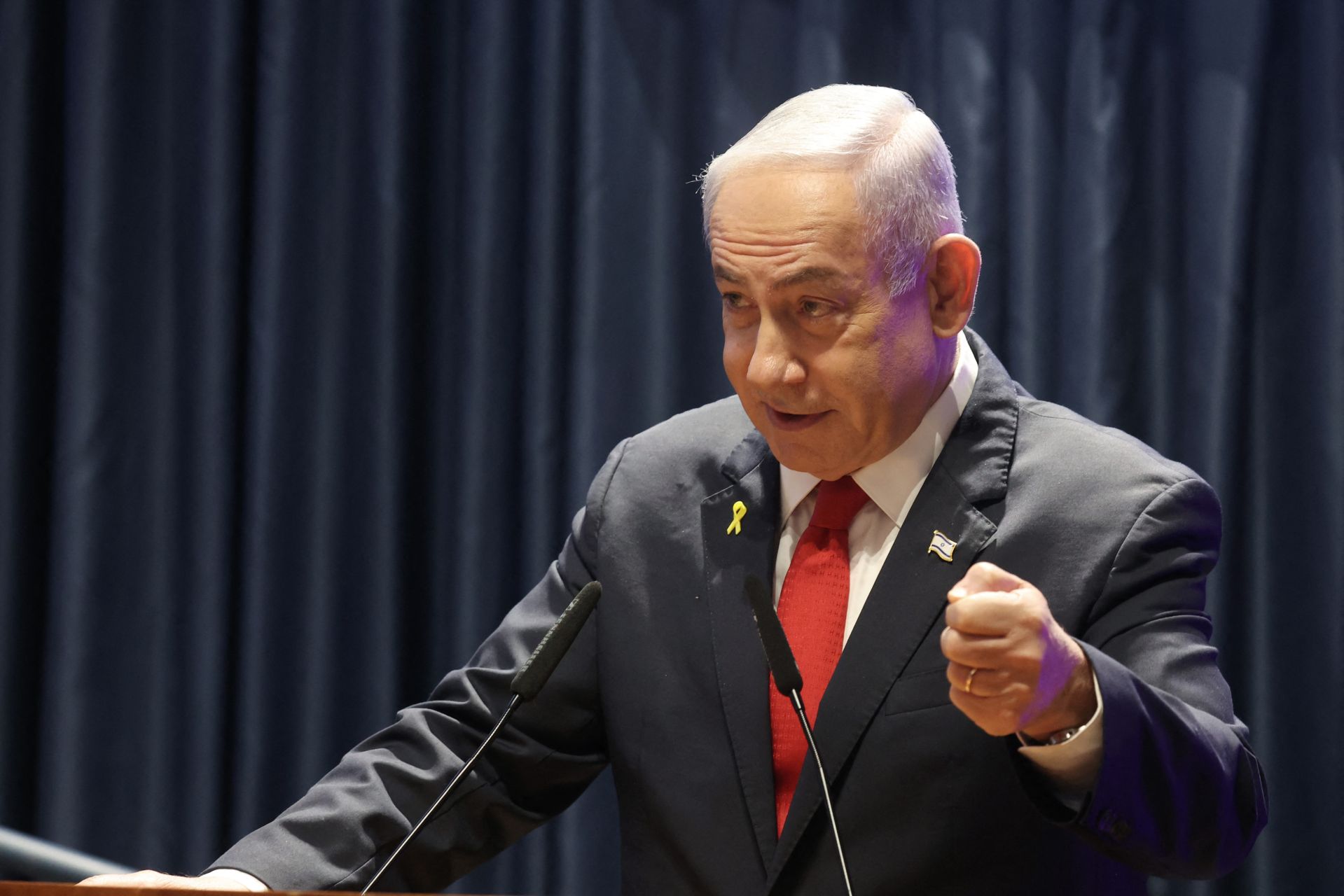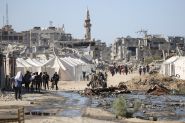- Home
- Middle East
- Netanyahu Vows to Act With 'Force, Determination' Against Yemen's Houthis

Israeli Prime Minster Benjamin Netanyahu speaks at the reopening ceremony of the Paraguayan embassy in Jerusalem in the presence of Paraguay's president, on December 12, 2024. ©Photo by GIL COHEN-MAGEN / AFP
Israeli Prime Minister Benjamin Netanyahu on Sunday vowed to retaliate against Yemen's Houthi rebels after they fired a missile at Tel Aviv, warning that Israel would target what he described as the last remaining arm of "Iran's axis of evil".
The Houthis struck Israel's commercial hub on Saturday with what they claimed was a ballistic missile, injuring 16 people and forcing many to leave their homes following the pre-dawn attack.
"As we acted with force against the terrorist arms of Iran's axis of evil, so we will act against the Houthis... with force, determination and sophistication," Netanyahu said in a video statement.
Mossad Chief David Barnea took a more forceful stance, suggesting direct strikes on Iran in response to the Houthi attacks.
Saturday's strike on Tel Aviv was the second such attack on Israel by the Houthis this week, and one of several since the war in Gaza broke out.
The Iranian-backed Houthis say they are acting in solidarity with Palestinians as the war between Israel and Hamas in Gaza rages on.
The war began on October 7, 2023, following Hamas' deadly attack on Israel.
Netanyahu's latest comments came after the United States said it struck targets in Yemen's rebel-held capital Sanaa on Saturday, hours after the Houthis hit Tel Aviv.
Among the targets was a Houthi missile storage centre and a "command-and-control facility," the US Central Command (CENTCOM) said in a statement.
US forces also shot down multiple Houthi drones and an anti-ship cruise missile over the Red Sea, it said.
However, two US Navy pilots were shot down over the Red Sea early Sunday in "an apparent case of friendly fire," the US military said.
The Houthis later claimed they had "targeted" the aircraft carrier USS Harry S Truman a day earlier in an operation that led to "shooting down an F-18 aircraft".
'Not alone' against Houthis
US and British forces have repeatedly struck rebel targets in Yemen in response to Houthi attacks on shipping in the Red Sea and Gulf of Aden, which are vital to global trade.
Israel has also previously struck the Houthis in Yemen, including hitting ports and energy facilities, after rebel attacks against its territory.
The latest Israeli strike against the Houthis was on Thursday, with Israeli warplanes striking Sanaa for the first time.
The Israeli response came soon after the rebels fired a missile that damaged an Israeli school.
On Sunday, Netanyahu acknowledged Washington's backing, saying that Israel was "not alone" in its fight against the Houthis.
"The US, as well as other countries, see the Houthis as a threat not only to international shipping – but to the international order", Netanyahu said in his video statement.
In a similar statement issued earlier this week, Netanyahu said the Houthis would "pay a very heavy price" for their attacks on Israel.
"After Hamas, Hezbollah and the (Bashar al-)Assad regime in Syria, the Houthis are almost the last arm of Iran's axis of evil," he said.
"They are finding out, and will find out, the hard way that whoever harms Israel –- will pay a very heavy price."
As well as Hamas, Israel has fought Iran-backed groups across the region since the start of the war in Gaza, including the Houthis in Yemen and a full-blown war against Hezbollah in Lebanon.
Those campaigns have killed several leaders of Hamas and Hezbollah, including the mastermind of the October 7 attack, Hamas chief Yahya Sinwar, as well as Iranian commanders.
Israel also assassinated Hezbollah chief Hassan Nasrallah, while Sinwar's predecessor Ismail Haniyeh was killed in a brazen attack in Tehran, which Iran and Hamas have blamed on Israel.
Israel further shocked Hezbollah with attacks involving exploding pagers and walkie-talkies that killed dozens of its fighters and wounded thousands, according to Lebanese authorities.
In late November, Israel and Hezbollah agreed to a ceasefire, which has stopped the former's blistering bombing campaign inside Lebanon but Israeli troops are still operating in southern parts of the neighbouring country.
Ruth Eglash with AFP
Read more



Comments